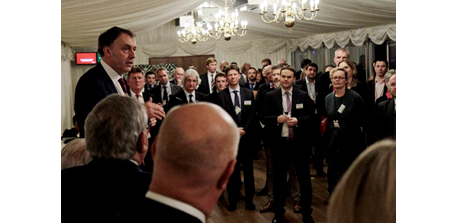News
Rolton Kilbride Officially Launched at the House of Commons
Rolton Kilbride Limited was officially launched at the House of Commons on Thursday, with an evening event sponsored by Bob Neill MP.
Staff and clients of sister companies Rolton Group and Kilbride Group were among the 140 guests, including other members of parliament and notable industry professionals.
The night began with a welcome and introduction from Colin Banyard, director of Rolton Kilbride; followed by speeches from Bob Neill MP, Peter Rolton, director of Rolton Kilbride; and Brian Binley, chair of Caring Community Energy Company. Peter Rolton spoke about the UK’s current energy landscape, and why Rolton Kilbride is needed; the following transcript is his full speech from the evening:
“Good evening.
People have asked me: ‘Why Rolton Kilbride?’ Well, to answer that question I’m going to ask you for a moment to think about the smart phone in your pocket or bag. What’s your favourite app – is it Angry Birds, Clash of Clans, or Candy Crush? Well forget all of those: what you really need in your life is the UK Energy app. With this app on your phone, at a glance, you can see how the UK is generating or importing its energy. Yes, I did say importing. Remember that thought – we’ll be coming back to it in a moment.
According to the Green Investment Bank, 27.7 million tonnes of residual waste – that’s the non-recyclable stuff, known in the trade as RDF or Refuse Derived Fuel – were produced in the UK in 2012. All of this could have been utilised in energy from waste schemes, but in reality, only about a fifth of it was, with the vast majority of the rest sent to landfill.
As recently as 2014, 2.6 million tonnes of RDF were exported overseas at a cost to industry or the tax payer of £220 million PA. Remember the importing of electricity? Well, some of that RDF we pay to have taken away is turned back into electricity and sold back to us at further cost via the Dutch Interconnector, a cable under the sea.
When I was younger, I remember many a boring car journey up or down the A1 past huge GW sized coal-fired power stations. These were located in the Yorkshire and Nottingham coal fields and it made sense; they were located close to their source of fuel. Or did it?
These stations were throwing away much of the electricity generated in transmission losses, whilst the heat was being expelled up cooling towers. Historically, this model of large grid power stations can be a little as 15 % net efficiency. Following recent Government announcements, all coal-fired power stations not fitted with carbon capture will be gone by 2020.
This winter, Ofgem has warned that we will have only 1.2 % spare generation capacity on the National Grid, and if capacity gets really tight, a number of the UK’s largest energy users have been signed up by the National Grid to switch off production between 4pm and 8pm on winter weekdays.
So where does that leave us?
Well it leaves us with:
- A need to stop paying to have RDF exported.
- A need to stop paying to buy back the electricity generated from it.
- A need to stop RDF from ending up in landfill.
- A need for more generating capacity on the grid
- A need to get more efficiency of generation and distribution from our energy infrastructure
- A need to produce low cost electricity and heat for the manufacturing industry and communities.
Rolton Kilbride will address all of these needs by integrating waste and energy strategies to create low-cost and sustainable heat and power using Advanced Conversion Technology (ACT) in a process called gasification.
We will develop local embedded power stations that are fuelled on RDF and directly connected to industry or communities. Projects will generate round-the-clock power and heat, demonstrating how a cost-effective low carbon transition can be achieved in the current political framework.
Our first project at Castle Bromwich is already in planning, whilst further projects in Swindon and Northampton are also under way. Rolton Kilbride’s energy solutions will support councils paying less to dispose of waste, and facilitate the potential for Community Interest Companies to generate income streams from local energy generation centres.
Our next speaker is former MP Brain Binley, now Chairman of Caring Community Energy, the Community interest Energy Company set up to distribute the electricity and heat from the Northampton project.”

Rolton Kilbride is a company which has been founded by Peter Rolton, chairman of Rolton Group, and Colin Banyard, chairman of Kilbride Group. The company will build energy from waste plants, to make use of non-recyclable waste by using it to generate electricity and heat. The generation of power from these plants will lower costs for high-energy users and councils looking to dispose of non-recyclable waste.
The provision of cheaper energy to industrial high-energy users will help to support the UK’s manufacturing industry, by. Rolton Kilbride’s projects will also have the potential to be combined with the work of Community Interest Companies (CICs), to benefit local communities with cheaper bills and the reinvestment of profits locally.
The first of these joint schemes looks set to be the Northampton Community Energy Scheme, which was announced to the press last Tuesday. The plans, if approved by the council and backed by local residents, will see an energy from waste centre commissioned and built by Rolton Kilbride, with the Caring Community Energy Company – a CIC – distributing the energy to local users and reinvesting profits back into local energy projects.
The evening was a great success and thoroughly enjoyed by those in attendance. It was fantastic to see so much interest in the new venture, and to be able to celebrate it in such a special venue.